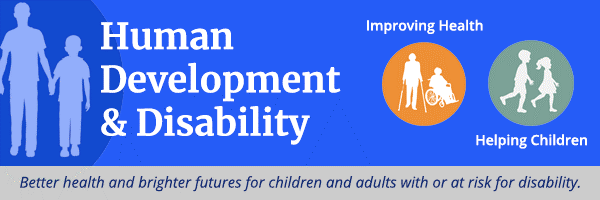DHDD Newsletter – February 2020

A Note from the DHDD Director:
Dear colleagues –
As you know, Dr. Coleen Boyle, NCBDDD’s director, retired at the end of January. Dr. Amanda Cohn is serving as the acting director until a permanent hire is made. Dr. Cohn is a pediatrician by training and comes from CDC’s National Center for Immunization and Respiratory Diseases. I had the opportunity to meet with Dr. Cohn a few weeks ago, and speak with her about the work of DHDD and discuss our plans for this year. Dr. Cohn was very impressed with the span of work that DHDD covers and hopes to be able to continue to learn about the work we do to improve the health of the populations we serve.
Sincerely,
Dr. Georgina Peacock, Director, DHDD
In the Spotlight
Funding Opportunity: Outcomes and Developmental Data Assistance Center for EHDI

CDC has released a Notice of Funding Opportunity (NOFO) for a new three- project called Outcomes and Developmental Data Assistance Center for EHDI (ODDACE) Programs. While using intervention and outcomes data can inform decisions and support positive outcomes among children who are deaf or hard of hearing (D/HH), states often lack the capacity to systemically gather these data. The purpose of this NOFO is to establish and support a new outcomes center to coordinate and assist participating states and strategic partners in determining how best to gather, analyze, and use specific intervention and developmental outcomes data.
Expected project outcomes include:
- Strategic partners have accurate and standardized surveillance data on the outcomes of children who are D/HH.
- Increased understanding of factors impacting the outcomes of children who are D/HH at the state and national level.
Due Date for Letter of Intent: 03/13/2020
Due Date for Applications: 05/07/2020
An informational conference call will take place on March 5, 2020, 2:00 pm, EST.
Join Zoom Meeting
https://zoom.us/j/159676554
Meeting ID: 159 676 554
929 205 6099 US
669 900 6833 US (San Jose)
Updated AAP Guidance on identifying children with developmental disorders
The American Academy of Pediatrics (AAP) has recently released two new guidelines.
- “Promoting Optimal Development: Identifying Infants and Young Children with Developmental Disorders Through Developmental Surveillance and Screening”
- “Identification, Evaluation, and Management of Children with Autism Spectrum Disorder”

These guidelines referenced Learn the Signs. Act Early. (LTSAE) as a resource to help identify and monitor developmental milestones. Please help spread the word about these new guidelines and share the following free resources:
- New FREE online PediaLink Course “Milestones Matter: Don’t Underestimate Developmental Surveillance.” This course was developed through a partnership with LTSAE and AAP and is designed to help pediatricians recognize the value of early identification and intervention when developmental delays are suspected and to identify the key surveillance and screening steps they should incorporate into their practice.
- LTSAE partnered with AAP to produce a video “Developmental Surveillance: What, Why and How.” The video explains what developmental surveillance is, how to do it, and why it is so important.
- Find more resources on the LTSAE Health Care Provider webpage and on the AAP’s Screening Technical Assistance and Resource (STAR) Center.
Email ActEarly@cdc.gov if you have any questions about these resources.
Publications
Trends in Supplemental Security Income and State Supplementary Payment Programs for Children with Disabilities

Congratulations to Dr. Lara Robinson and her co-authors from DHDD’s Child Development and Disability Branch for the publication of their article “Trends Over Time and Jurisdiction Variability in Supplemental Security Income and State Supplementary Payment Programs for Children With Disabilities” in the Journal of Public Health Management & Practice. Supplemental Security Income (SSI) related policies can reduce childhood poverty and improve population-level child health. CDC researchers explored trends in the number of states that have State Supplementary Payment (SSP) Programs. The published findings suggest that SSP program availability has not increased markedly over the last 20 years, with 45 states offering benefits to eligible individuals in 2018. However, fewer than half of states reported SSP availability to children with disabilities and their families.
DHDD In the Field
2019 Annual Disability Statistics Compendium
On February 11, DHDD scientist, Dr. JoAnn Thierry, attended the 2019 Annual Disability Statistics Compendium event in Washington, D.C. She presented Data Activity Updates from NCBDDD’s Division of Human Development and Disability on the “Latest on Federal Data Collection” panel.
Invited Lecture
On February 19, Dr. Marshalyn Yeargin-Allsopp, DHDD’s senior medical officer, delivered the 16th annual Hamilton E. Holmes Memorial Lecture at Emory University in recognition of Black History Month. Dr. Yeargin-Allsopp, the first black female graduate of Emory University School of Medicine, pioneered research about the prevalence of autism which led to the formation of the Autism & Developmental Disabilities Monitoring (ADDM) Network.
DHDD’S mission is to lead inclusive programs to optimize the health and development of children and adults with, or at risk for, disabilities.
